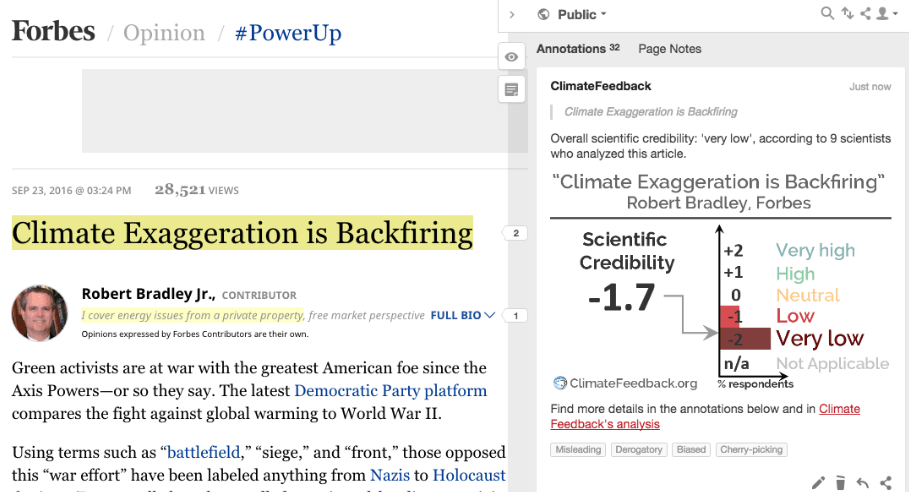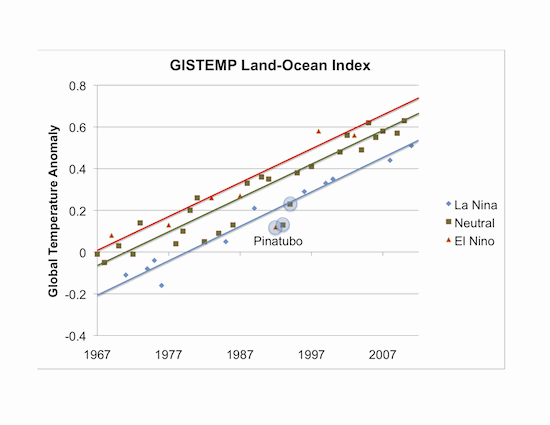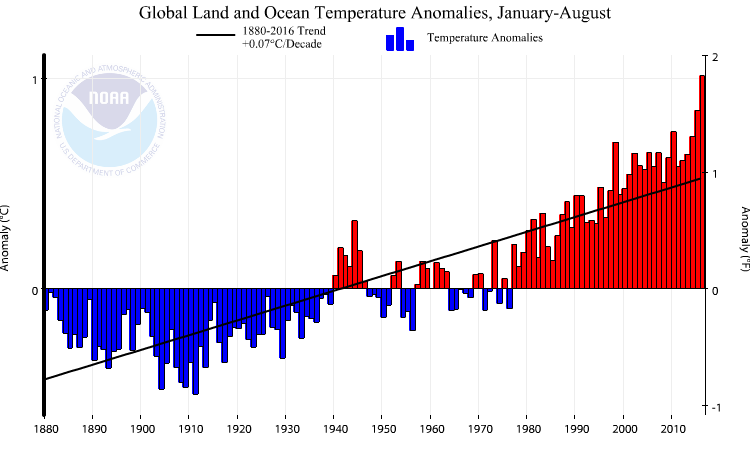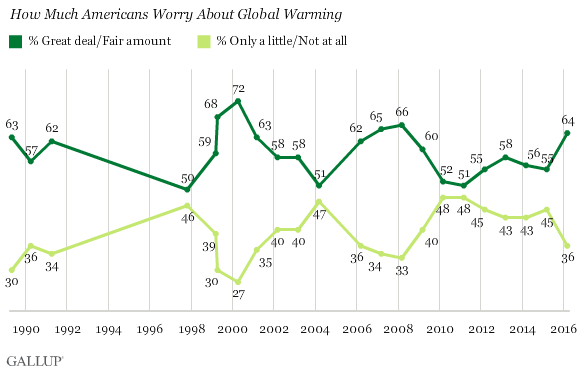Nine scientists analyzed the article and estimated its overall scientific credibility to be ‘very low’.
A majority of reviewers tagged the article as: Biased, Cherry-picking, Derogatory, Misleading.

SCIENTISTS’ FEEDBACK
SUMMARY
While inaccurate climate alarmism should certainly be avoided, this Forbes’ article fails to demonstrate that climate science has been alarmist. According to the scientists that reviewed this article, the piece relies on false assertions, misleading representations of science and scientists, and poor sources.
Because the climate system responds somewhat slowly, the extent of future impacts depends critically on current greenhouse gas emissions, which can commit us to long-lasting changes. The author fails to grasp this point when he asserts that the worst impacts of climate change should have already occurred if they were realistic.
The net economic costs of climate change are likely to be significant and to increase over time. However, attempts to measure climate change economic impacts at the global scale is highly dependent on economists’ assumptions and there are a hosts of climate change impacts that cannot be accounted for by consumption-based global aggregations of economic impacts (e.g. impacts on ecosystems, more pronounced impact on developing countries…).
See all the scientists’ annotations in context
REVIEWERS’ OVERALL FEEDBACK
These comments are the overall opinion of scientists on the article, they are substantiated by their knowledge in the field and by the content of the analysis in the annotations on the article.
Victor Venema, Scientist, University of Bonn, Germany:
This picking of quotes that are convenient for Robert Bradley Jr.’s narrative while ignoring what most climate scientists say is one of the most used rhetorical tools of this piece. The other is the use of offensive emotional language to reduce the critical thinking of his readers. People should know that Forbes is nowadays just a blogging platform.
Britta Voss, Postdoctoral Research fellow, U.S. Geological Survey:
This article contains no serious evidence to support its claims that climate science is fraudulent and climate action is pointless. All of the sources it cites either do not truly support the claims or are not valid in themselves. It provides very little information of any sort, and is mostly a collection of debunked theories, cherry-picked references to actual science, and unsubstantiated mantras.
Kyle Armour, Assistant Professor, University of Washington:
There is very little substance to evaluate here. Yes, one can find examples of when individual scientists or politicians have exaggerated the impacts of climate change. But to present those examples as if they are mainstream views, when they are not, is very misleading.
Frank Vöhringer, Dr. rer. pol, Scientist, Ecole Polytechnique Fédérale de Lausanne (EPFL):
The article is a polemic with many derogatory and misleading statements. Overall, it’s a piece of disinformation. The pro-fossil-fuel bias becomes most apparent at the end of the article.
Jeremy Fyke, Research staff scientist, Los Alamos National Laboratory:
On the whole, this article is not an objective critique of climate science.
KEY TAKE-AWAYS
The statements quoted below are from Robert Bradley Jr.; comments and replies are from the reviewers.
“ The discrepancy between model-predicted warming and (lower) real-world observations has inspired new respect for natural climate variability relative to greenhouse-gas forcing. ”
Victor Venema, Scientist, University of Bonn, Germany:
Robert Bradley Jr. probably makes the typical mistake of equating the spread of individual model simulations within the ensemble spread with the model uncertainty. If climate models are used for decadal climate prediction, like Robert Bradley Jr. does here, the uncertainty is twice as large as the model spread. (more details and explanations)
Natural variability has been studied by science since the beginning. That El Niño fluctuations can give the appearance of a “hiatus” is something scientists have warned about since the likes of Robert Bradley Jr. have started their “hiatus” meme, ignoring all those warnings. Without any need for statistical expertise, this can be seen in the plot below from the Texas State Climatologist.
“ ‘Although some researchers doubted the existence of a global warming hiatus because of coverage bias, artificial inconsistency, and a change point analysis of instrumental Ts records,’ a just-published study at Nature.com’s Scientific Reports found, ‘it is now accepted that a recent warming deceleration can be clearly observed.’ ”
Jeremy Fyke, Research staff scientist, Los Alamos National Laboratory:
…which has been truncated by several years of record temperatures increases—on top of previous record warmth. This is the superposition of a forced trend on top of natural variability. The cherry-picking of time series to prove that the Earth isn’t warming due to anthropogenic influence is a classic climate change contrarian tactic.
Emmanuel Vincent, Research Scientist, University of California, Merced:
This graph of global temperature helps to put the “slowdown” of warming that occurred around the 2000-2010 period in perspective. It is misleading to put the emphasis on the slowdown without reminding that, over the long term, the temperature keeps rising.
Source: NOAA
Britta Voss, Postdoctoral Research fellow, U.S. Geological Survey:
This article in Scientific American provides context left out by the author on the scientific debate over the warming “hiatus.” By cherry-picking only this line from a single study, the author misrepresents the painstaking process of data analysis and hypothesis testing that led to that conclusion. As the Scientific American article points out, the authors of the study cited by the author were confident in reporting their findings—which do not refute the existence of anthropogenic global warming—because science exists to challenge previous work and is constantly incorporating new information that may alter previous conclusions, a fact which undercuts the author’s claims repeated throughout his article that climate science is a politically-motivated house of cards.
“Back in the late 1980s, the UN claimed that if global warming were not checked by 2000, rising sea levels would wash entire counties away.”
Britta Voss, Postdoctoral Research fellow, U.S. Geological Survey:
Rising seas are, in fact, forcing many Pacific island nations and coastal communities in the United States to plan for permanent evacuation. Although low-lying areas will not “disappear” into the ocean anytime soon, nuisance flooding, erosion, and storm surges are making maintaining these communities economically untenable.
“In 2009, then-British Prime Minister Gordon Brown predicted that the world had only 50 days to save the planet from global warming. But fifty days and years later, and the earth still spins.”
Britta Voss, Postdoctoral Research fellow, U.S. Geological Survey:
This is extremely misleading. The article this claim refers to reports that Gordon Brown stated that the 2009 Copenhagen Climate negotiators had 50 days to adopt an adequate agreement to prevent catastrophic climate change. The time span of 50 days is inaccurately used by the author here to suggest that Brown thought the world—rather than the negotiations—would end in 50 days.
“…scientist James Hansen unequivocally stated: ‘We have at most ten years—not ten years to decide upon action, but ten years to alter fundamentally the trajectory of global greenhouse emissions.’”
Victor Venema, Scientist, University of Bonn, Germany:
The classic because-x-did-not-happen-yet-thus-x-will-not-happen fallacy. A fallacy that is especially ignorant in the case of a problem like climate change which responds slowly, like an oil tanker…
“Time is up on Gore’s ‘point of no return’ and Hansen’s ‘critical tipping point.’ But the two fathers of the global-warming movement (Hansen and Gore got it going back in the summer of 1988) have nary admitted their exaggeration nor set a new timetable for effective action.”
Mike MacCracken, Chief Scientist for Climate Change Programs, Climate Institute:
Bradley indicates no understanding of the time it will take to change over the global fossil-fuel energy system and the inertia of the climate system. Observations are already showing that the accelerating loss of ice from the Greenland and Antarctic ice sheets is giving indications of committing the world to a few meters (roughly 5-10 feet) of rise in global sea level over the next few centuries, which would seriously disrupt many coastal cities and swamp a number of island nations—and there is no indication that actions to reduce emissions can reverse this commitment—so, we are indeed moving past the point where emissions cutbacks can keep sea level and climatic conditions near to the conditions that have allowed civilization to flourish over the past several centuries
“Sensitivity estimates—defined as the temperature effect from the enhanced greenhouse effect—have been coming down in the peer-reviewed literature…”
Kyle Armour, Assistant Professor, University of Washington:
This statement is somewhat misleading. Estimates of equilibrium climate sensitivity have been coming down in one branch of the literature that uses global energy budget observations (e.g. Otto et al 2013). However, recent work suggests that those energy budget estimates are biased low, moving estimates back up again once those biases are corrected for (see my recent commentary*). Meanwhile, estimates of sensitivity from other methods (e.g., paleoclimate, process-based observational constraints or climate model simulations) haven’t budged. Altogether, I don’t see any reason that the IPCC range isn’t still our best guess.
- Kyle C. Armour (2016) Projection and prediction: Climate sensitivity on the rise, Nature Climate Change
“climate economists see a positive externality, not a negative one, from the human influence on climate. (In technical lingo, the so-called social cost of carbon would be negative.)”
Gary Yohe, Professor of Economics and Environmental Studies, Wesleyan University:
This is cherry-picking at its worst. You can always find an economist who will make enough assumptions so that he or she can give you the answer you want. In this case (references the social cost of carbon), you can get a benefit ONLY if you assume a very high discount rate (like 5% so that future generations do not matter), and you ignore equity issues, and you assume that warmer climates in the crop-intensive areas will not include an increase in the intensity and/or frequency of intense weather (drought, floods, etc….), and you do not recognize that warmer temperatures mean more pests and more weeds.
see the Summary for Policymakers of the Report of Working Group II to the fourth assessment of the IPCC
Richard Tol, Professor of Economics, University of Sussex:
The social cost of carbon would indeed be negative for a low climate sensitivity. This is because the net impacts of climate change only turn negative at more pronounced warming, and this would occur in a more distant future for a low climate sensitivity. At the same time, the positive impacts of carbon dioxide fertilization would be unaffected.
Mike MacCracken, Chief Scientist for Climate Change Programs, Climate Institute:
The present calculations of the “social cost of carbon” tend to be bottom up and so include only those costs that one can reasonably quantify. As a result many types of impacts are simply left out of the calculation, like the cost of losing the culture of an island nation that is swamped, the impacts of ocean acidification and biodiversity loss, the actual social cost of climate change (e.g., of the New England climate becoming that of the Southeast, Sweden like Spain, etc.)…
Britta Voss, Postdoctoral Research fellow, U.S. Geological Survey:
At a minimum, the author should be honest and say that “some climate economists” conclude that the net externalities of climate change may be positive, as the article he links to discusses only the economic views of its author and anecdotes from two climate scientists. Further, the article the author links to discusses only the net economic impacts on “the US and most of the developed countries”, while climate change will impact economies around the globe. This is not a meaningful argument anyway, as the exact value of the climate sensitivity does not inherently determine whether climate impacts will be economically net positive or negative.
Frank Vöhringer, Dr. rer. pol, Scientist, Ecole Polytechnique Fédérale de Lausanne (EPFL):
There are positive and negative economic consequences of climate change.
On a global level and for average temperature increases of more than 2 degrees Celsius, most climate economists find a negative influence of climate change on human welfare (and even more clearly on ecosystems), although negative net damages have been calculated in some instances. Net damages tend to be more pronounced in tropical countries, which usually have lower per capita incomes. For this reason, purely consumption-based global aggregations of climate impacts tend to show lower net damages than aggregations which consider differences in the marginal utility of income across countries. The evaluation of the net damages thus depends on whether the impacts on poor countries are properly considered. Indeed, the issue of international aggregation of benefits and damages is ethically problematic to an extent that calculating a social cost of carbon at a global level may conceal more than it reveals.
“Falsified and sure-to-be-falsified exaggerations from a parade of Ph.D. scientists”
Britta Voss, Postdoctoral Research fellow, U.S. Geological Survey:
The author does not provide any evidence of “falsified” scientific reports of climate predictions or observations.
“Peter Wadhams, professor of ocean physics at the University of Cambridge, predicted ‘global disaster’ from the demise of Arctic sea ice—in four years. He too, is eating crow.”
Victor Venema, Scientist, University of Bonn, Germany:
These predictions of Peter Wadhams have been opposed by all climate scientists I know of. This picking of quotes that are convenient for Robert Bradley Jr.’s narrative while ignoring what most climate scientists say is one of his most used rhetorical tools.
Kyle Armour, Assistant Professor, University of Washington:
Indeed. Wadham’s claims have been roundly refuted by the climate science community. They are certainly an example of exaggeration, but to suggest that they somehow represent the scientific mainstream is a great distortion.
[See Climate Feedback review of the latest prediction by P. Wadhams]
“Can the “uncertainty monster” in climate research, and particularly climate modeling, be acknowledged?”
Kyle Armour, Assistant Professor, University of Washington:
A quick look through the IPCC assessment reports reveals long discussions about uncertainty in our understanding and climate prediction. Moreover, uncertainty in global warming projection exists mainly at the high end—toward more warming—for simple physical reasons.
Gary Yohe, Professor of Economics and Environmental Studies, Wesleyan University:
The scientific community has been scrupulously careful to report uncertainties in terms of “likely” or “confidence”. The planet has warmed; that is unequivocal. Humans have contributed; that is more than 95% assured.
See: IPCC 5th Assessment Report
Victor Venema, Scientist, University of Bonn, Germany:
The “uncertainty monster” is a reason to act faster. Uncertainties about how strongly the climate will respond makes the risks of climate change larger.
“…obsessing about climate change is avoiding a frank discussion about the here-and-now problems of budget deficits, the federal debt, school choice, entitlement reform, and so on.”
Jeremy Fyke, Research staff scientist, Los Alamos National Laboratory:
Of course, this is a classic false dilemma used by climate change contrarians, which claims that you can’t deal with climate change AND other issues simultaneously. This is patently wrong.
“Not only do polls suggest the public is unmoved at home and in abroad…”
Britta Voss, Postdoctoral Research fellow, U.S. Geological Survey:
This claim is incorrect. The source given to support “the public is unmoved at home” is an article titled “Poll: 91% Of Americans Aren’t Worried About Global Warming.” However, this article reports that “only 9.2 percent of Americans rank global warming as their biggest concern.” Not ranking global warming as your biggest concern is not the same thing as not being concerned at all. According to a 2016 Gallup survey, 64% of Americans are “worried a ‘great deal’ or ‘fair amount’” about global warming:



Several “pillars” of the consensed climate science community have recently acknowledged the shortcomings of the near-surface temperature anomaly products (https://rmets.onlinelibrary.wiley.com/doi/full/10.1002/joc.5458) and of the current ensemble of climate models (https://journals.ametsoc.org/doi/abs/10.1175/JCLI-D-16-0333.1).
The producers of the “scary scenario” political science continue to use RCP8.5, though it has been widely discredited. These numerous “studies” contribute nothing to our understanding of climate science, nor are they intended to do so.
The self-appointed mouthpiece of the consensed climate science community continues to spot the “fingerprints” of anthropogenic climate change in extreme weather events, in the total absence of supporting evidence; and, in the face of evidence of declining frequency and intensity.
Meanwhile, issues regarding actual climate sensitivity, forcings and feedbacks receive relatively little attention, as does the challenge of verifying a climate model and demonstrating its predictive ability.
[…] Comment: Nice try. The “nonpartisan” Climate Feedback group is alarmist, no skeptics allowed. I have challenged their fact check of my own work (see here). […]